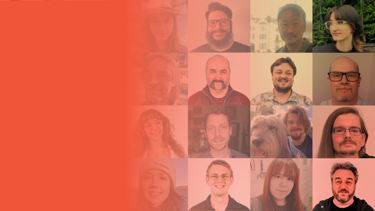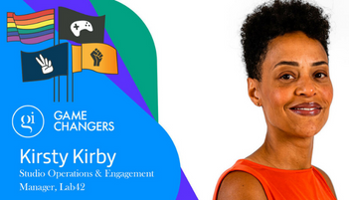How to become a Games Artist with Lee Piper

Since joining Lab42 as Art Director in 2021, Lee has successfully grown the team from just 7 people to 21, with most of that growth taking place through 2022. Tripling the size of the team in just over a year, Lee has welcomed industry veterans and new talent alike. Knowing that the games industry can be one of the hardest to break into, especially for artists, Lee shares his insights into how to land your first games job.
Do you need a degree to be a games artist?
While a degree can be useful, it is not essential to becoming a games artist, as long as you have a strong portfolio.
“From indie to large studios there are several opportunities for people from all backgrounds to get a foot in the games industry and make a living doing something they love,” says Lee, who has worked at a variety of studios over his time in the games industry.
Many people looking to get into the games industry set their sights on the bigger, well-known AAA studios, but Lee believes it’s worth casting your net a little wider, especially if you’re still honing your skills as an artist.
“I might be biased, but I believe it is worth applying to smaller studios as well as the ‘big name’ studios. In my experience smaller to mid-size studios tend to be more personal and let you find your niche - you get more input into the art you are creating which is something we all care about as artists.”
Build your portfolio
The most important aspect of your application is your portfolio. Use it to showcase your best work but keep it concise.
“Initially, we look for talent and skill in the appropriate discipline, usually demonstrated in a portfolio or showreel – this is what will get a candidate the invitation to interview.”
This is especially true when the team are looking to recruit niche specialisms.
“When I started at Lab42, the existing team were doing a great job servicing the art requirements at the studio – covering everything from concept to character art. However, as the games we make get more complex and larger in scope, we decided hiring more discipline specialists rather than generalists would be the way to go.”
At interview: what to expect
“At interview the candidate’s passion for the work, knowledge, and how they will work with the art team and wider studio is evaluated”
Lab42 take great care to ensure everyone who joins the team is a good cultural fit, but this doesn’t mean that you have to force yourself to be outgoing or extroverted; it’s more about communication styles and the drive to do your best work.
“We look at how the candidate will add skills to the team, gain new knowledge, take and give feedback and grow in their time at the studio – this is all is very important to us,” says Lee, “We expect juniors to have talent and passion to learn, but little experience. People new to the industry shouldn’t be too worried about a lack of experience if they have the art skills.”
Ask for feedback
Even if you don’t get offered the job, the process is still a valuable learning experience.
“I would say to any aspiring artists reading, don’t be disheartened by rejection. Ask for feedback if you feel an interview went well but you were not offered the position. Act on the feedback if it’s constructive and makes sense to how you want to improve, or how you see your career going.”
And it’s not just potential employers who can give valuable feedback.
“If you are not getting interviews, get peers to review your work. Approach people in the industry and ask for feedback – a few people (not everyone – you may get ignored!) will be happy to look and give you some pointers. Again, act on feedback if it makes sense for you. If someone takes the time to give you feedback do acknowledge it or thank them, you never know when you might bump into them again!”
“Rejection will not always be about the quality of your work or how you come across at interview - some positions could be looking at very specific skills in specific software or using specific techniques, again it’s good to get feedback – you may have a skill gap to work on for the position you want.”
...and keep on learning
Whatever your level of formal education, continuous learning is a key part of being a good game developer. The tools and methods used to make games art are continuously evolving, so developing an aptitude for self-directed learning can really set you apart. “I would say to anyone wanting to get into games, there are loads of tools and lots of information at your fingertips and best of all most of it is free!” says Lee, whose own team has regular knowledge-sharing sessions as well as dedicated learning days. “All you need is the talent, passion and drive to take advantage of what’s there.”
Looking to get started? Here are some free resources to help you grow your skills:
- YouTube
- Atomhawk Resources
- ArtStation Learning
- Blender Tutorials
- Unreal Learning Library
- GoDotTutorials
- Develop: Brighton Conference YouTube Channel
If you’re looking to get your start in the video games industry, entry level positions are often available at Lab42 and Sumo Group. Check out our careers page to see if there’s a good fit for you.



.jpg?width=350&height=200&rmode=max&token=lyKv5mbSBGEkw%2FLtDSZL9X3qH9Alclu207OhXXqrku0%3D)